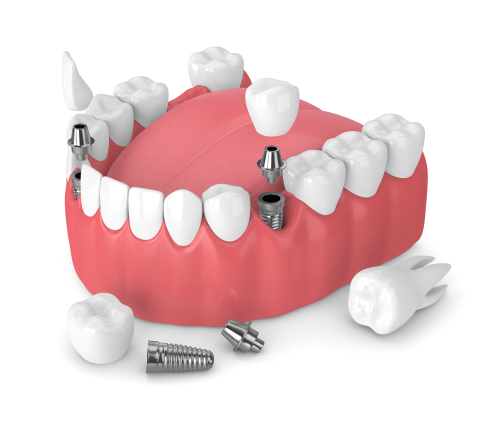Many American adults live with decaying or missing teeth, but solutions are available. Decayed or missing teeth not only affect your appearance; they’re also linked to a variety of oral health conditions. Dental prosthetic services aim to replace missing teeth, provide jaw support and stability, and restore your smile.
About Prosthodontics and Who Can Benefit
Dental prosthetics, or prosthodontics, is the branch of dentistry that deals with the replacement or reconstruction of damaged teeth and other parts of the mouth. Patients who can benefit from seeing a prosthodontist have lost or damaged teeth due to trauma, neglect, or congenital defects.
Whether you have lost or damaged teeth due to tooth decay, gum disease, oral cancer, or an injury, a prosthodontist can help.
What is a Dental Prosthetic?
A dental prosthesis, or prosthetic, is a device that replaces or repairs missing or damaged teeth or parts of the hard or soft tissues of the jaw and palate. There are a few common prosthetics that help patients restore their smiles and oral function.
Dental Implants

If you want the most effective and natural-looking prosthesis, a dental implant may be your best option. While a dental implant does require a surgical procedure to anchor the prosthesis, the final result is a permanent replacement that looks exactly like your natural teeth.
Implant surgery involves placing a titanium anchor that will bond with your jawbone, providing a strong foundation for tooth replacement. After the implant tooth has been placed, you will be able to chew and speak normally—as if you had never lost your tooth.
Implants are indistinguishable from the other teeth and can last for many years, even a lifetime when maintained properly. The additional major benefit of an implant is that the titanium anchor stimulates bone growth, an important factor for the health of the jawbone.
Crowns or Bridges
Dental crown placement is one of the most common restorative procedures performed in the United States. This may be because of the versatility of dental crowns; they can be used to improve the strength, size, and appearance of your natural tooth. They are often placed to protect the teeth after dental procedures, such as root canal treatment or dental implant surgery.
Patients unhappy with a discolored or uneven tooth can find an easy fix with a crown, which also helps to preserve the tooth from dental decay. Crowns may be comprised of porcelain, ceramic, metal, stainless steel, or some combination of these materials.
Similar to a crown, a bridge is a fixed prosthetic device that must be cemented to the existing teeth or implants. While a crown usually serves a restorative purpose (to “cap” a damaged tooth or implant), a bridge is used as a replacement. A bridge hangs in the gap of the missing tooth, attached to the adjacent teeth. Because a bridge can lose its support if the teeth are damaged by dental decay, it is very important to maintain good oral hygiene by flossing and brushing daily.
Dentures
A removable dental prosthesis, called dentures, can function as a partial or complete replacement for missing teeth. A partial denture consists of a small set of replacement teeth attached to a gum-colored base held together by a metal frame. It fills in the spaces of the missing teeth and prevents other teeth from shifting in the mouth.
A complete denture has a similar structure but with a full set of false teeth, which is placed in the mouth about eight to 12 weeks after the teeth have been extracted. The dentures need to be fitted by a qualified dentist to guard against sliding or other sizing issues. Patients with many missing teeth often prefer dentures because they are the most affordable type of dental prosthetic available.
How Do I Decide What’s Best for Me?
Depending on the particular condition of your teeth, your dental and medical history, and your personal preferences, your prosthodontist will recommend a treatment model. A combined approach may be used in some cases. For example, a crown or bridge might be attached to a dental implant.
You will also want to consider whether you want a fixed or removable prosthetic. Crowns and bridges are fixed, as well as dental implants (perhaps the “most fixed” option, as a dental implant often will not need to be replaced or repaired). Both fixed and removable dentures are available options.
Seek the Expertise of Penn Dental Family Practice
Replacement and restoration are complex treatments requiring the expertise of a qualified dental professional. Consult with an expert prosthodontist in Philadelphia and the surrounding area at Penn Dental Family Practice.
Our prosthodontists are leaders in the field, many of whom teach the next generation of elite providers at the University of Pennsylvania School of Dental Medicine. Download our free flyer about creating your dream smile and schedule an appointment by calling (215) 898-7337 today!


